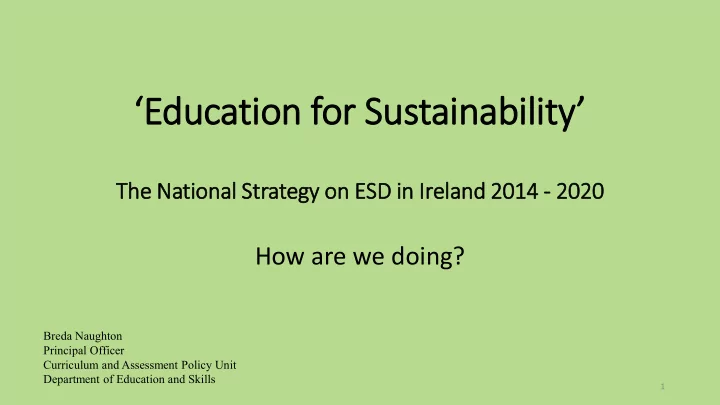

‘Education for Sustainability’ The National Strategy on ESD in in Ir Ireland 2014 - 2020 How are we doing? Breda Naughton Principal Officer Curriculum and Assessment Policy Unit Department of Education and Skills 1
Remin indin ing ourse selv lves: The Strategy aims to equip learners with: • the relevant knowledge (the ‘what’), • the key dispositions and skills (the ‘how’) and • the values (the ‘why’ ) to become informed active citizens who take action for a more sustainable future. The areas intrinsic to ESD are: • en envi vironmental is issues es • soci ocio-economic ic is issues es • polit olitical is issues es. • The Strategy has a total of 44 required actions. 2
Some updates: What has been achie ieved? • Education for Sustainable Development Advisory Group established • An ESD link available at - https://www.scoilnet.ie/esd/ • Questions on sustainable development included in the 2015 Lifeskills survey • The NCCA has audited, from a SD perspective, the primary and post primary curriculum 3
Results from Lifeskills Survey 2015 • Primary • 89% pupils are supported to gain Knowledge and Skills for SD • 71% reported that teachers are adequately prepared to teach ESD • 54% reflect ESD in school plan • 98% encourage pupils to reduce energy and waste • Post -Primary • 76% students are supported to gain Knowledge and Skills for SD • 55% reported that teachers are adequately prepared to teach ESD • 45% reflect ESD in school plan • 88% encourage pupils to reduce energy and waste 4
What has been achie ieved? (2) • ‘Politics and Society’ is a new Leaving Certificate subject – • Phased introduction in Feb 2016 - 41 schools and almost 1,000 students • Over 60 more schools taking the subject in Phase Two, from Sept. 2018 • SOLAS focusing SD related provision in the FET sector • Our Sustainable Future: DES provided an update on its actions in Q3 2017 • More primary schools should be encouraged to establish student councils • 8% in 2009 • 21% in 2015 5
What has been achie ieved? (3) • NCCA include the voice of students when new curricula and specifications are being developed • DES with DCYA consulted with young people in 2015 on ESD • Parents and Learners’ Charter – being progressed • DES on Government inter-departmental Committee on Sustainable Development • DES interacts with WWGS, Green Schools, SEAI, ECO-UNESCO, IDEA, Irish Aid, etc. 6
Sustain inable Energy Effic iciency in in school l build ildin ings • DES has won national and international awards for its SSE in schools • Research informs work – 45 research projects in train – including consideration of renewable energy • Hybrid approach adopted – natural resources and energy efficient technologies • Solar heating, energy efficient boilers, room temp controls, high insulation standards, water efficiency – including rainwater for flushing toilets • Energy in Education project with SEAI … provides practical guidance to schools, also training for school community 7
Conversations started • With Teaching Council on the role of ESD in the ITE programmes • With Education Centre Network to determine what Continuing Professional Development (CPD) is being sought and made available • On ESD in Higher Education 8
Taki king In International l developments in into account • The United Nations’ 17 Sustainable Development Goals, 2015 -2030 – a key driver of global and national policy • Inter-departmental committee working to prepare Government report for UN in July 2018 • The Council of Europe’s “Competences for Democratic Culture” • The ET2020 projects of the European Commission, promoting respect, tolerance, democratic values, etc. 9
And so? We think: • Quite a lot has already been done • Quite a lot is actively being done • But we still have a lot to do Over to you now… 10
Focus Group Tasks: Each table has a Chair and Rapporteur. Each table will focus on one priority question for 30 mins and the other two for approximately 10 mins each. The priority question will vary from table to table, and you will be informed at the outset which tables are focusing on which specific questions. Question 1: What do you see as the key successes (highlight two) of the ESD strategy to date – and why? Can you give 1-2 recommendations for ESD 2017-2020? Question 2: How does UN SDG 4.7 impact on what’s already in place in Ireland’s education system? Can you make 1-2 recommendations for ESD based on your discussion? Question 3 : “Environmental , Socio- Economic and Political issues” are the three priority areas highlighted within the Strategy. Have they each got equal consideration within ESD to date and/or does this vary by education sector? Can you make 1-2 recommendations for ESD priorities based on your discussion? Ten minutes at the end should be used to agree the key points identified… particularly your priority question 11
Afternoon Session – Good ideas for ESD in Practice • ESD in Post-primary Schools • ESD in Further Education • ESD in Higher Education Format • Presentation • Discussion • Reporting back 12
Recommend
More recommend